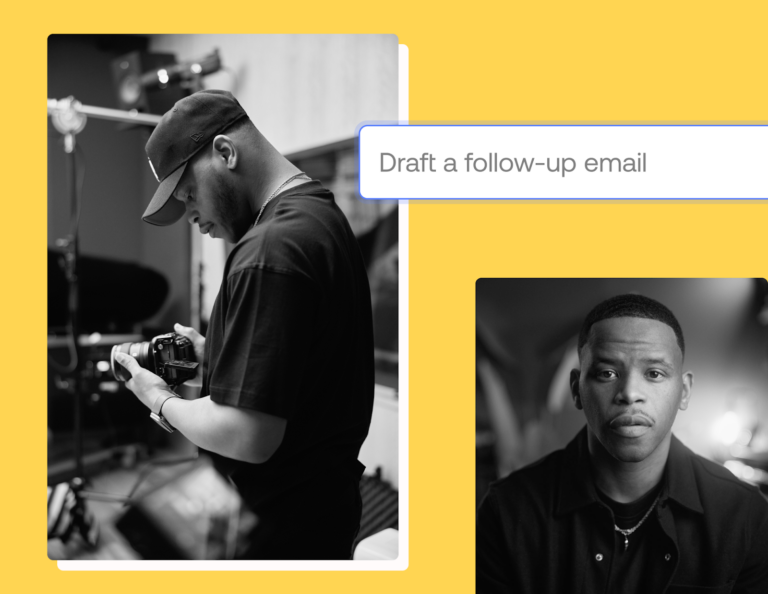Running your own business is exciting: You’re out on your own. Doing your own thing. Paving your own path. But for the same reasons why it’s amazing, it can also be really hard (oh hey, double-edged sword).
Because many of you have shared a desire to learn how others navigate through it all, we’re talking to small business owners about their wins, struggles and the lessons that helped them grow.
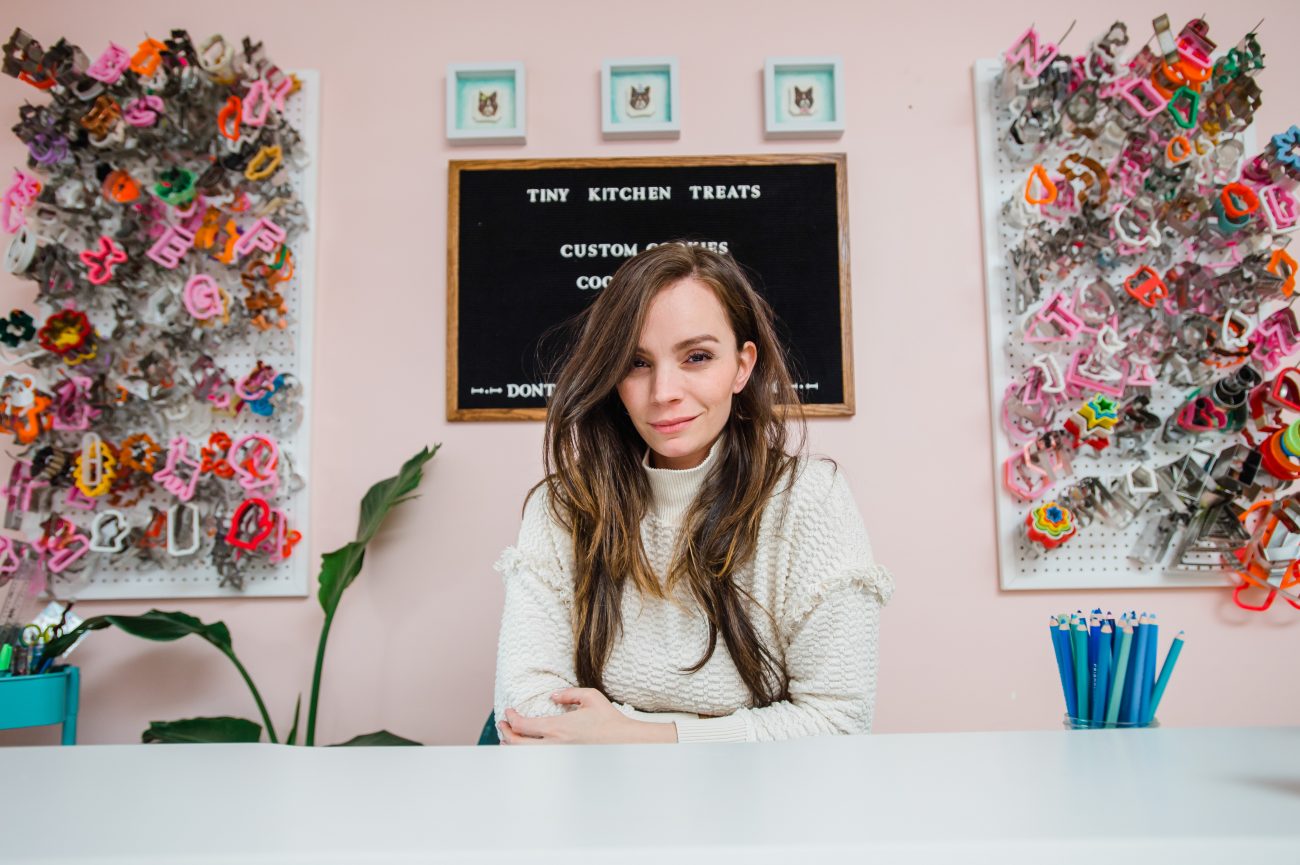

First up is HoneyBook member Marisol Morley who might just win for coolest job title ever: Cookie Artist. A born and bred New Yorker, she’s been a cookie artist and business owner at Tiny Kitchen Treats (TKT) for almost four years.
Fun Fact
Marisol’s first career was as a recording artist under Wyclef Jean. “I was discovered by his executive producer when I was 18,” she says. “I was shopping at Forever 21 and singing to myself and then BOOM. Two weeks later I was on a plane to meet Teddy Riley.”
Tiny Kitchen Treats turns four at the end of April. Congrats! Which accomplishments are you most proud of?
TKT has done SO much (I am so proud of her), including creating:
- The royal baby shower cookies
- Cookies for Jennifer Lopez, Harpaars Bazaar, Ellen Degenerous and Warby Parker (we love their business model of giving a pair of glasses for every pair you buy)
- Cookies featured in the finale episode of Broad City. It was super exciting getting a call from their art department as I’m a big fan.
- A yule house for Sour Patch Kids which was featured on Amazon Prime as a holiday video this past Christmas. It was a project that no one else would do: a 3-floor gingerbread house that would fall apart in strategic ways, with various scenes playing within each of the rooms.
- The gingerbread village inside of the life-size gingerbread house that was on display in Madison Square Park. We got a call from Good Housekeeping to create it a few weeks after making the Sour Patch yule house. I showed up with my team, my mother-in-law, and my 11-day-old baby boy, James, and we got it done.
Have you always been a baker?
Yes and no. I started when I was five years old. My mom would hand me a wooden spoon and a bowl, and I would get to help with the mixing. I was hooked from my first experience. My dad taught me how to whip meringues by hand (we didn’t own any type of mixer), and I would beg to make parva cookies (a dense cookie with an egg wash, sort of like a shortbread).
How Tiny Kitchen Treats Got Its Start
What was your measure of success when you first started? How does that compare to now?
Surviving! I was working full time at Moelis & Company, a boutique investment bank, as an executive assistant to one of the partners, and finishing my BA at night part-time. I barely slept and would take naps in the conference rooms so that I could live to do it again the next day, ha! My husband wanted to kill me because I would be baking in the kitchen of our studio apartment until 5 a.m. and he was maybe 20 feet away trying to get his few hours of sleep (all the while completing his summer internship in IB). I knew TKT was going places because I would make it get there, and I realized I’d jumped into a bubble that was new and flying high.
Now we have a shop manager, a baker, and various artists who come in part-time on an as-needed basis. The clients are the best of the best. It’s really a dream come true.
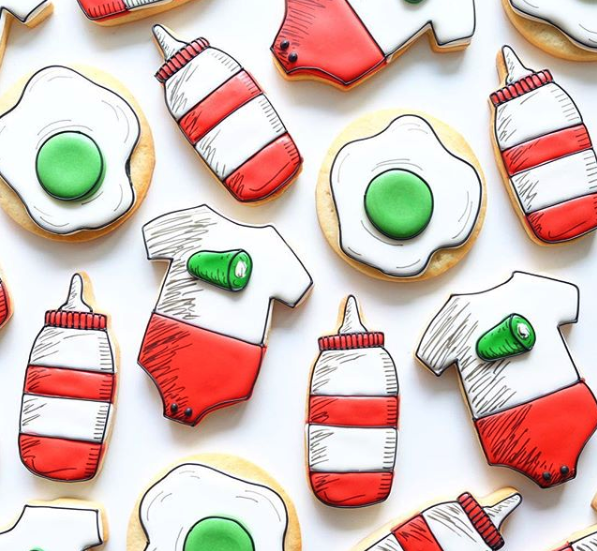
Based on your definition of success your first year, were you successful?
Yes. I survived and then—thanks to proving to myself that I could survive in the most difficult of situations—I gave myself the confidence to thrive.
Was there ever a moment where you thought, “I can’t do this,” and if so, how did you overcome that?
Absolutely. Every few days! I kid, but yeah we all have those moments. Anyone who tells you otherwise is lying to make themselves look tougher, but there is strength in allowing yourself to be vulnerable and to feel breakable.
There is strength in allowing yourself to be vulnerable and to feel breakable.
It’s backbreaking work building a business from the ground up with nothing but bootstraps and elbow grease. One night, I was building a shelf that I’d ordered on Amazon to house the $1000’s-worth of bulk sprinkles that I’d just bought. After four hours, I could not get it to work (and I am a professional Ikea furniture builder), and I found myself on the floor crying in exhaustion and feeling stupid and defeated. Of course, I wasn’t ACTUALLY crying about a shelf—I was crying because of everything else.
It’s a lonely thing dream building. Often times—even when your family and friends support you, and mine did/do—it’s really you in your head keeping something alive that seems like a pipe dream to many. The mental stress of that, after you quit a really good job and put it all on the line with no business degree, etc. is like the weight of the world on your shoulders. Luckily, I had already met my best friend and shop partner, Ashley Holt of Sugar Monster. I called her and we ugly cried together on Facetime until I was laughing at myself for stressing out about a shelf.
What was the most fun part of your first year of business?
The magic of endless possibility and the response on social media. At that point, I was growing exponentially at a rate of about 1,000 followers a month. That really makes you feel legit and heard. I had learned how to work the machine to work for me and was at the forefront of the decorated-cookie craze. I’m not a surfer, but I did try once, and it felt like when I finally caught that wave and felt myself being propelled to shore. Except the wave was a monster 50-ft. wave and the 50-ft. wave was a cookie.
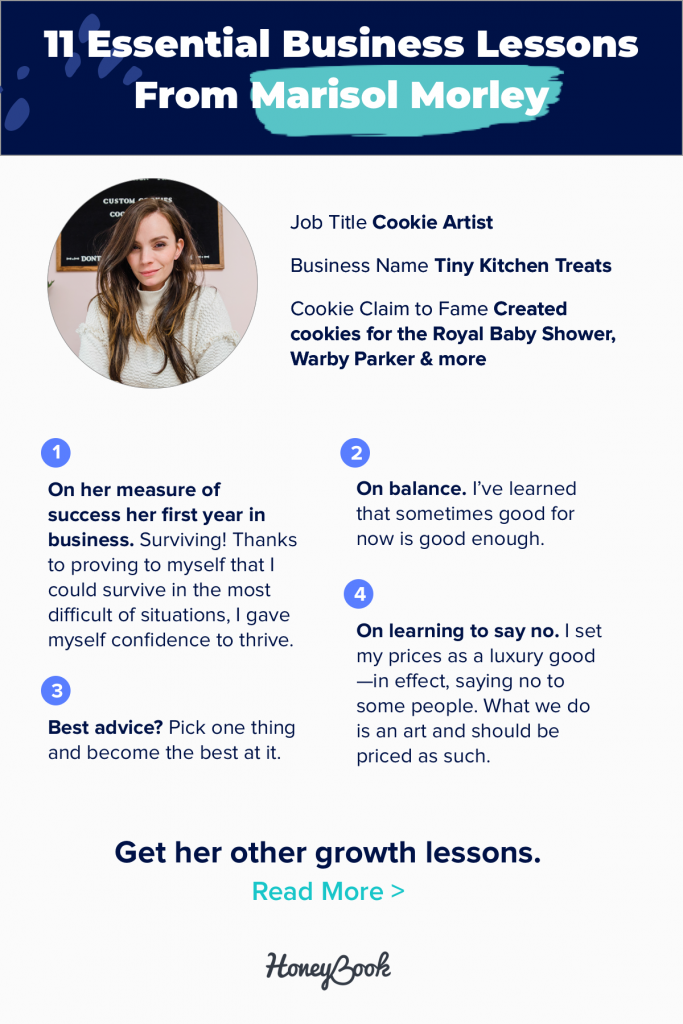
How did you figure out how to set your prices?
I looked at what other people were charging and charged $.50 less. About $4.50 a cookie. In four years that has increased by over 200% for the average starting price of a cookie. I keep looking at my brand, the value I give, and adjusting for overhead, skill, our name, etc. We really deliver on customer service, from designing the cookies all the way through to the deliciousness of our product, the artwork and, finally, the packaging.
Business Tools and Resources
What new things did you need to learn how to do when you got started? Which resources did you turn to for help?
Instagram! I would share for family and friends but knew nothing about using it as a business tool.
Also, learning to manage my time and say no. I really sucked at it then and probably still suck at it now, but I have gotten better. One way I say no is setting my prices as a luxury good—in effect, saying no to some people. What we do is an art and should be priced as such. Most sweets businesses are run by women, and we tend to underestimate the value of our work.
One way I say no is setting my prices as a luxury good.
I also learned to build my own site using Squarespace (and they actually became a client this year!)
Which tools did you use to help run your business? Are there any new tools you use to run your business now?
At first, I used Paypal to process payments, and it was awful. It’s not integrated so I felt myself constantly spinning wheels, replying to emails, working on an invoice in Word, PDF’ing, attaching to an email, then sending a PayPal invoice. I was reinventing the wheel every time and dropping balls despite my best efforts.
HoneyBook to the Rescue
Now I use HoneyBook, a small business management platform which keeps all of my communications with each client in one place, including payments, photos exchanged, previous work done, emails, proposals and online invoices. The program also has THE BEST feature where you can create different email templates. So I have one for a price quote, follow-up, review email, etc., saving me hours upon hours every day.
Did you ever struggle with feelings of loneliness? If so, where did you find support?
100%. I became a business owner and mom of two all within four years. Holy crap, that was hard. No more time for myself, my social life or my marriage. It’s been rough. But I’m a survivor. I talk to others going through the same thing (mostly, Ashley and my insta cookie/cake friends), I let myself have a crying session here and there and don’t shame myself for being human.
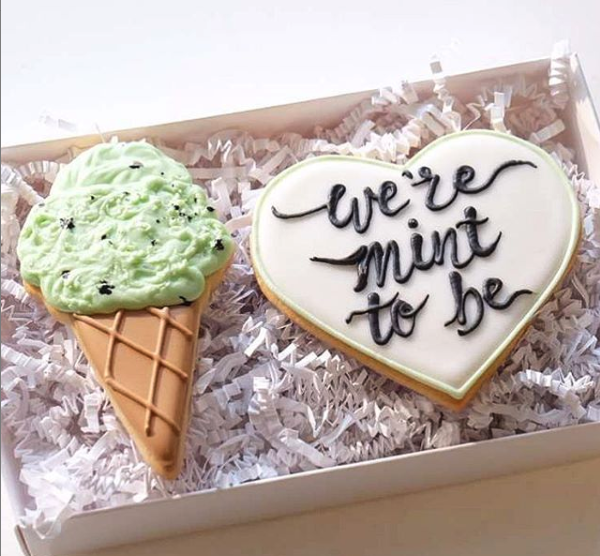
I admit when things are hard and have learned to let go/ask for help. That was the biggest thing I learned. It’s helped me grow as a business, a friend, a wife, a mother, sister, daughter, etc. I thought I could watch my kids full-time and grow my dream and it’s impossible. I’ve found a good balance now, and I’ve learned that sometimes good for now is good enough.
I’ve found a good balance now, and I’ve learned that sometimes good for now is good enough.
Rome wasn’t built in a day and neither was TKT. Last month, I finally hired a shop manager and a full-time nanny and that has been a game changer. I’ve been setting up dinner with friends and finding time for just myself, too.
Your Business: Then and Now
We’d love to know how you spend your time and how that’s changed from your first year to now.
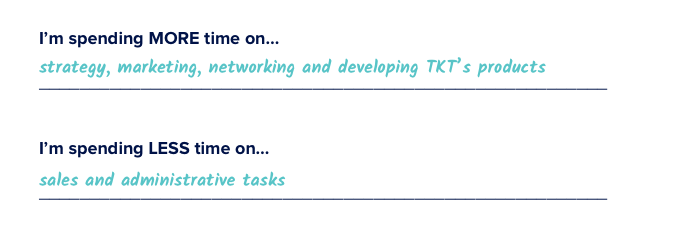
| Task | % of an average work day in your first year | % of an average work day now |
| Sales/bookings (i.e., responding to/following up with inquiries, meetings with inquiries/clients) | 15% | 10% |
| Providing my service | 20% | 10% |
| Business strategy + planning | 5% | 10% |
| Marketing | 10% | 15% |
| Administrative tasks (e.g., preparing invoices, sending contracts, managing paperwork, general email, etc.) | 25% | 10% |
| Accounting | 0% | 0% |
| Networking/partnerships | 10% | 20% |
| Employee relations | 0% | 5% |
| Developing your product/service | 15% | 20% |
TKT’s growth has been incredible. Which three actions do you credit for that growth?
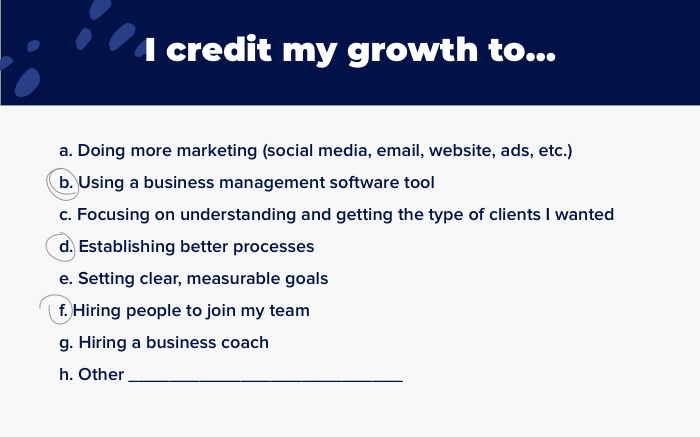
What’s the best business advice you got and from whom?
The IB held monthly speaker series—they would have an influential person come in once a month and do a talk—to keep people motivated and hungry. Martha Stewart came in and I told her about my business idea (all-in-one party planning/treat supply). She gave me the most simple advice: Pick one thing and become the best at that one thing.
Marcus Samuelson came in, too, and that man is an inspiration. He told us about his experiences with failure and when I asked him what advice he’d give me, he said: Just keep pushing.
That’s sort of been my life motto. I have “failed” at so many dreams, but the moment I stopped seeing those as failures, and rather segues into the next part of my journey, was the moment I started loving myself and letting myself be an ever-evolving person. I began to listen to the universe and that’s when the magic started to happen.
I can’t say I wished I’d done anything differently, because of the outlook above—it’s all part of my journey. And even if it’s not, wishing I could change something doesn’t actually change anything. It’s unkind to look back through the 20/20 vision of retrospect and say I should have done this and that. Instead, I am always self-evaluating. I identify areas of weakness, and then do something about it moving forward. No crying over spilled milk or burnt cookies. Just clean it up and buy yourself a louder timer LOL.
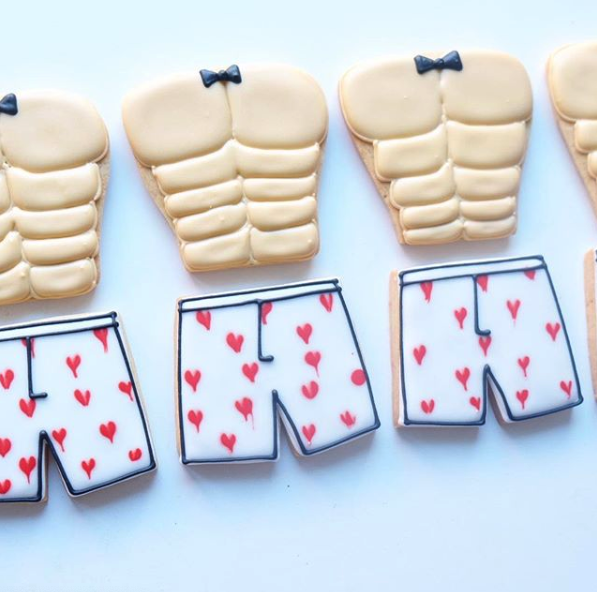
Tiny Kitchen Treats on HoneyBook
What’s your favorite HoneyBook feature?
The preset emails! We save SO much more time to do the things we really want and need to do, and the “voice” of my brand is always there because I created them.
What’s your top HoneyBook trick?
I use HoneyBook to send an email asking clients for a Google/Facebook review where I’ve hyperlinked those for them already. Reviews really help build confidence in your business and HoneyBook makes it so easy to see which orders have been completed so you can send those emails off before you archive the project.
Thanks so much, Marisol!

